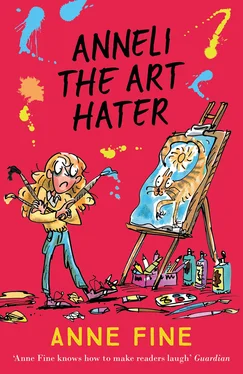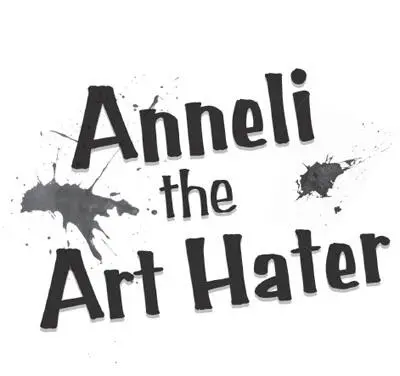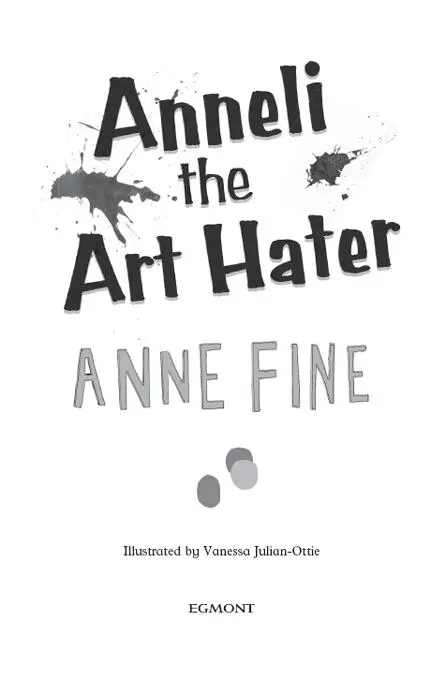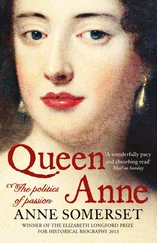Also by Anne Fine
You can visit Anne Fine’s website www.annefine.co.uk
1 ‘More pink, dear?’
2 ‘Got an attic!’
3 ‘What a great fizzing cheat!’
4 ‘Precious to sell and precious to keep.’
5 ‘Not painting again!’
6 ‘My garden and my pool.’
7 ‘He was forbidden.’
8 The Running-Away Box
9 ‘Nonsense!’
10 ‘A life of crime!’
11 ‘Only six holly trees!’
12 Private and pleasant, and long ago
‘More pink, dear, don’t you think?’
Anneli didn’t, but was too polite to say so.
Miss Pears dabbed once or twice at Anneli’s painting.
‘There! Much, much better. But you’ll need more.’
Anneli scowled as Miss Pears turned her back and started mixing more pink. Anneli hated painting. She hated anything to do with art. She loathed messing with clay and smudging with pastels. She disliked greasy crayons and tatty scraps of material and dried pasta shells and leftover Christmas wrapping paper.
And she was bored stiff by all those endless discussions about what everyone was going to do.
‘Aliens from Outer Space? What a good idea, Henry! That should get rid of some of this aluminium foil.’
She hated the chaotic sharing out of all the horrid stuff that they were going to do it with.
‘Bags the glue!’
‘I asked first !’
‘No, you did not !’
‘Swap the green lace for half those beads? Please? Pretty, pretty please ?’
‘He asked first !’
‘No, he didn’t!’
And whatever they chose in the end, Anneli hated doing it. She’d toil away, getting it finished as soon as possible, but she resented all Miss Pears’ encouraging remarks as she made her way round the room, rescuing a warped drawing of a cat for one person, mixing an awkward red-brown colour for another, breaking up fights.
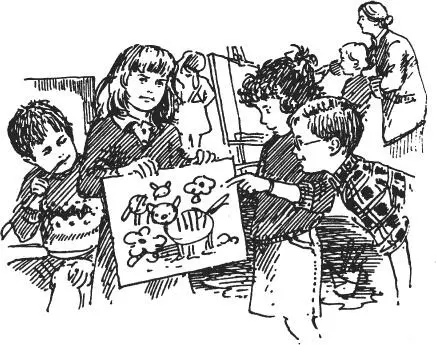
Afterwards, Anneli hated having to show her work to her friends, especially to Henry. She hated carrying it home and having to stand there while her mother praised it, however awful it was, then stuck it on the fridge door for the whole world to see.
And after that, Anneli hated having to look at it every morning over her cereal while it got grubbier and grubbier, until the sticky tape at last dried up and mercifully it fell off and slid out of sight under the fridge.
She hated other people’s art as well. In the school corridors, she turned her eyes away from the bright splashes of colour pinned on the walls. When children’s art was on the television she clutched her belly, pretended to throw up or switched straight off.
Class trips to the local art gallery made her squirm.
‘Look at that!’ Miss Pears would say to them. ‘Isn’t that breath-taking ? Have a good peep at the brush work. Don’t we all wish that we could paint like that ?’
‘No.’
‘Yuk.’
‘Well, she got paid .’
Yes, Anneli really hated art. Miss Pears turned back with the freshly mixed pink and Anneli wiped the grumpy look from her face; but a scowl still sat in her heart as she dabbed and poked and scraped about with the bald old paintbrush, trying to use up a bit of the extra pink anywhere there was room so as not to seem rude, but longing for the bell to ring and release her.
Brrrrrrr!
‘Heavens!’ Miss Pears was astonished. ‘The bell! We haven’t even begun putting away. Oh, dear me!’
Anneli sighed. It happened every week. Everyone knew the bell was going to ring, and nobody warned her. They all preferred ten minutes of clearing up the art materials to ten extra minutes of whatever might come after. It was a gamble. You might be lucky and miss maths. But, then again, you might miss wonderful, peaceful, almost-as-good-as-being-back-home silent reading.
Today Miss Pears waited till they were all tidy again and then she said:
‘And now I want to talk to you about raising a little more money for the new Art Room.’
Anneli groaned. Why did Miss Pears want to go on about that again? Hadn’t they given enough of their pocket money, and wheedled enough out of their parents to build a new Art Room out of gold bricks and equip it with diamond-studded easels and ermine paint-rags?
Perhaps there were now plans to fill the paint pots with molten silver?
Anneli came out of her grumbly daydream long enough to hear Miss Pears saying the words ‘need even more money’.
Oh, no. Not more! They’d reached the class target three times already. But Miss Pears was mad on painting, and clearly wouldn’t stop.
‘I don’t want you to go running to your parents, who have enough strains on their purses. Let’s think of things to do ourselves. Can anyone think of any ways of making a little money? No one? Henry?’
Anneli slumped on her folded arms and shut her eyes. She heard good old Henry droning on about baking cakes to sell in break-time, and being paid to sweep up dead leaves and looking for precious old forgotten things in attics. Then Henry’s drone seemed to turn into the sound of waves lapping a sunlit shore, and she was miles away, knee-deep in salty water, her arms speckled with gritty golden sand, her eyelids spangled with glistening water drops.
Surina brought her back by asking, ‘What are you going to do, then?’
‘What?’
‘To make money. What are you going to do?’
‘Nothing.’
‘ Nothing?’
‘Oh, I don’t know,’ said Anneli irritably. ‘I’ll think of something.’
And think she did, all the way home.
It wasn’t so easy. After all, if money were so easy to come by, someone smart would already have scooped it up. It was all very well to talk of selling cakes at break-time. But Anneli’s mother came home from work far too worn out to start to bake for other people.
What about Jodie? Jodie and her little boy Josh lived in the top half of the house, and just as Anneli’s mother looked after Josh whenever Jodie had to work in the evenings, so Jodie was in charge of Anneli when Anneli’s mother was teaching dance classes at the Leisure Centre.
Would Jodie help her bake cakes?
Probably she would. But she’d have to let Josh help – she was his mother, after all – and Josh was only two and a half. He was a messer. He’d drop the egg shells in the cake mixture, and fiddle with the oven dial so the cakes cooked too slowly, or too fast. He’d spoon the runny icing over the tops while the cakes were still too hot, and put the cherry halves on upside down.
He’d ruin the whole batch. Anneli knew it.
She reached the corner.
The great wrought-iron gates guarding the driveway that led up to Carrington Lodge were padlocked shut, as usual. As usual, Anneli stopped, dropped her school bag and clutched the bars, peering inside. The Lodge was now a children’s home, and sometimes, in fine weather, the children could be seen in the gardens, some lying on rugs on the lawns, some rushing around in their wheelchairs, some being carried to and fro by paid helpers like Jodie.
Читать дальше
